大学英语听说课程教学大纲
- 格式:doc
- 大小:278.50 KB
- 文档页数:48
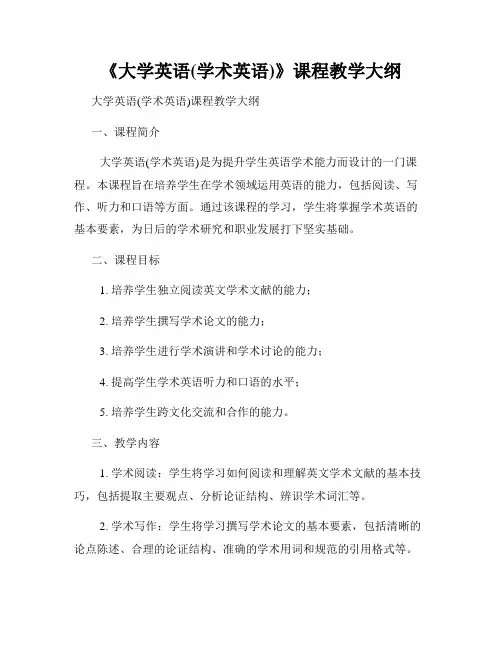
《大学英语(学术英语)》课程教学大纲大学英语(学术英语)课程教学大纲一、课程简介大学英语(学术英语)是为提升学生英语学术能力而设计的一门课程。
本课程旨在培养学生在学术领域运用英语的能力,包括阅读、写作、听力和口语等方面。
通过该课程的学习,学生将掌握学术英语的基本要素,为日后的学术研究和职业发展打下坚实基础。
二、课程目标1. 培养学生独立阅读英文学术文献的能力;2. 培养学生撰写学术论文的能力;3. 培养学生进行学术演讲和学术讨论的能力;4. 提高学生学术英语听力和口语的水平;5. 培养学生跨文化交流和合作的能力。
三、教学内容1. 学术阅读:学生将学习如何阅读和理解英文学术文献的基本技巧,包括提取主要观点、分析论证结构、辨识学术词汇等。
2. 学术写作:学生将学习撰写学术论文的基本要素,包括清晰的论点陈述、合理的论证结构、准确的学术用词和规范的引用格式等。
3. 学术口语:学生将通过小组讨论、学术演讲等形式,提高自己在学术场合进行口语表达的能力,包括流利的语言表达、清晰的逻辑思维和自信的演讲技巧等。
4. 学术听力:学生将进行学术讲座和学术论坛的听力训练,提高听取学术演讲和学术讨论的能力,包括理解主旨观点、获取关键信息和分辨听力材料中的学术词汇等。
5. 跨文化交流:学生将学习不同文化背景下的学术交流规范和礼仪,提高跨文化交流和合作的能力,以适应全球化学术环境的需求。
四、教学方法本课程将采用多种教学方法来促进学生的学习效果:1. 授课讲解:教师将通过示范和解释的方式介绍学术英语的基本知识和技巧。
2. 案例分析:教师将提供学术文章和案例供学生阅读和分析,帮助他们理解和运用学术英语的要素。
3. 小组讨论:学生将通过小组讨论的形式分享自己的学术观点和经验,提高学术交流能力。
4. 学术演讲:学生将进行个人或小组学术演讲,锻炼自己在学术场合进行口语表达的能力。
5. 视听材料:教师将使用相关的学术讲座录音和视频材料,帮助学生提高学术听力和口语表达能力。
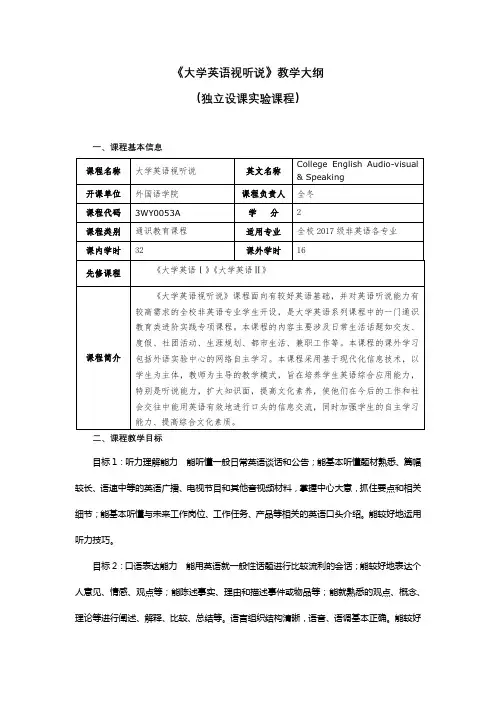
《大学英语视听说》教学大纲(独立设课实验课程)一、课程基本信息二、课程教学目标目标1:听力理解能力能听懂一般日常英语谈话和公告;能基本听懂题材熟悉、篇幅较长、语速中等的英语广播、电视节目和其他音视频材料,掌握中心大意,抓住要点和相关细节;能基本听懂与未来工作岗位、工作任务、产品等相关的英语口头介绍。
能较好地运用听力技巧。
目标2:口语表达能力能用英语就一般性话题进行比较流利的会话;能较好地表达个人意见、情感、观点等;能陈述事实、理由和描述事件或物品等;能就熟悉的观点、概念、理论等进行阐述、解释、比较、总结等。
语言组织结构清晰,语音、语调基本正确。
能较好地运用口头表达与交流技巧。
目标3:学习能力与跨文化交际能力具备一定的自主学习能力,初步形成较系统的学习策略,发展一定的跨文化交际能力,有一定的文化底蕴和人文素养。
三、实验内容及学时分配(一)实验内容及要求实验项目1:New Friends, New Faces(支撑课程目标1、2、3)教学内容:Meeting new people and describing people对学生的要求:交际训练实验项目2:V acation(支撑课程目标1、2、3)教学内容:Describing weather, vacation habits and preferences对学生的要求:交际训练实验项目3:All about you(支撑课程目标1、2、3)教学内容:Talking about your favorite pastimes, teams and clubs对学生的要求:交际训练实验项目4:Change(支撑课程目标1、2、3)教学内容:Making changes in your life according to your plans and dreams对学生的要求:交际训练实验项目5:Around the World(支撑课程目标1、2、3)教学内容:Asking for and giving directions in the neighborhoods and cities对学生的要求:交际训练实验项目6:Home Sweet Home(支撑课程目标1、2、3)教学内容:Describing different kind of houses, apartments and roomsLearning how to rent houses, apartments and rooms对学生的要求:交际训练实验项目7:Your Health(支撑课程目标1、2、3)教学内容:Learning English expressions of parts of bodyDescribing men’s appearance and how to keep healthy对学生的要求:交际训练实验项目8:Jobs and Ambitions(支撑课程目标1、2、3)教学内容:Describing various abilities, personality and jobs对学生的要求:交际训练(二)课程学时及分配四、考核方式及要求考核方式:考试评价环节1: 平时训练(20 %)听说训练系统上机学习;评价环节2: 课堂表现(10 %)课堂综合表现、课堂讨论、交流和问答等;评价环节3: 课堂陈述或口试(20 %)学生根据本课程实验项目涉及的主题,教师自行安排学生提前准备个人陈述或自编对话,随堂表演。
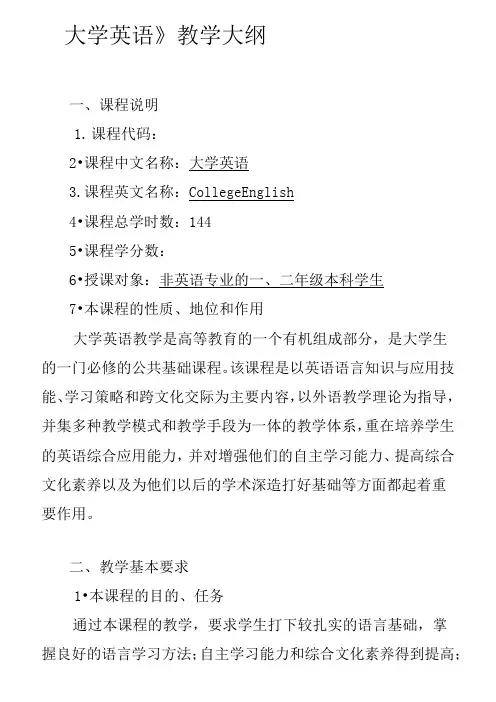
大学英语》教学大纲一、课程说明1.课程代码:2•课程中文名称:大学英语3.课程英文名称:CollegeEnglish4•课程总学时数:1445•课程学分数:6•授课对象:非英语专业的一、二年级本科学生7•本课程的性质、地位和作用大学英语教学是高等教育的一个有机组成部分,是大学生的一门必修的公共基础课程。
该课程是以英语语言知识与应用技能、学习策略和跨文化交际为主要内容,以外语教学理论为指导,并集多种教学模式和教学手段为一体的教学体系,重在培养学生的英语综合应用能力,并对增强他们的自主学习能力、提高综合文化素养以及为他们以后的学术深造打好基础等方面都起着重要作用。
二、教学基本要求1•本课程的目的、任务通过本课程的教学,要求学生打下较扎实的语言基础,掌握良好的语言学习方法;自主学习能力和综合文化素养得到提高;具有较强的英语综合应用能力,特别是听说能力;能用英语有效地进行口头和书面的信息交流;了解英语国家文化背景和社会风貌;为以后的学术深造打下必要的跨文化交际能力基础。
2.本课程的教学要求根据《大学英语课程教学要求》,大学阶段的英语教学要求分为三个层次,即一般要求、较高要求和更高要求。
一般要求是高等学校非英语专业本科毕业生应达到的基本要求。
较高要求或更高要求是为有条件的学校根据自己的办学定位、类型和人才培养目标所选择的标准而推荐的。
三个层次的英语能力要求如下:1)一般要求:听力理解能力:能听懂英语授课,能听懂日常英语谈话和一般性题材的讲座,能听懂语速较慢(每分钟130-150词)的英语广播和电视节目,能掌握其中心大意,抓住要点。
能运用基本的听力技巧。
口语表达能力:能在学习过程中用英语交流,并能就某一主题进行讨论,能就日常话题用英语进行交谈,能经准备后就所熟悉的话题作简短发言,表达比较清楚,语音、语调基本正确。
能在交谈中使用基本的会话策略。
阅读理解能力:能基本读懂一般性题材的英文文章,阅读速度达到每分钟70词。
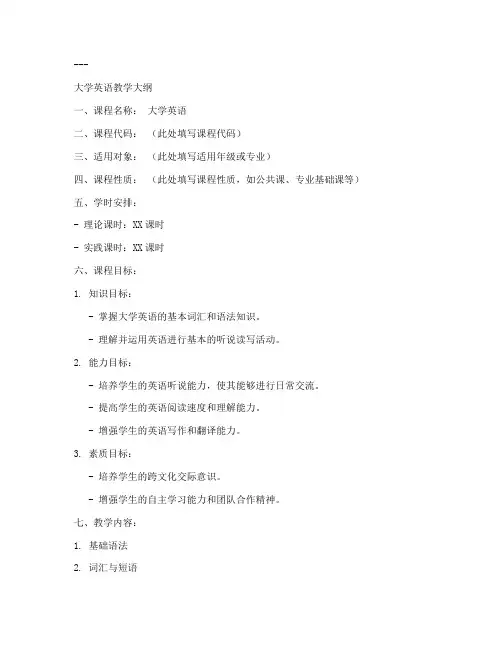
---大学英语教学大纲一、课程名称:大学英语二、课程代码:(此处填写课程代码)三、适用对象:(此处填写适用年级或专业)四、课程性质:(此处填写课程性质,如公共课、专业基础课等)五、学时安排:- 理论课时:XX课时- 实践课时:XX课时六、课程目标:1. 知识目标:- 掌握大学英语的基本词汇和语法知识。
- 理解并运用英语进行基本的听说读写活动。
2. 能力目标:- 培养学生的英语听说能力,使其能够进行日常交流。
- 提高学生的英语阅读速度和理解能力。
- 增强学生的英语写作和翻译能力。
3. 素质目标:- 培养学生的跨文化交际意识。
- 增强学生的自主学习能力和团队合作精神。
七、教学内容:1. 基础语法2. 词汇与短语3. 阅读理解4. 听力理解5. 口语表达6. 写作技能7. 翻译练习八、教学方法:1. 讲授法:教师讲解语法、词汇和写作技巧。
2. 讨论法:鼓励学生积极参与课堂讨论,提高口语表达能力。
3. 练习法:通过大量的练习,巩固所学知识。
4. 多媒体教学:利用多媒体手段,如视频、音频等,提高教学效果。
九、考核方式:1. 平时成绩:包括课堂参与、作业完成情况等,占总成绩的30%。
2. 期中考试:考察学生对所学知识的掌握程度,占总成绩的40%。
3. 期末考试:综合考察学生的听说读写能力,占总成绩的30%。
十、教学进度安排:(此处列出详细的学期教学进度表,包括每周的课程内容、作业布置、考试安排等)十一、教学资源:1. 教材:《大学英语》系列教材2. 辅助教材:《大学英语阅读》、《大学英语听力》等3. 网络资源:在线学习平台、英语学习网站等十二、教学评价:1. 定期进行课堂观察,评估教学效果。
2. 收集学生反馈,不断改进教学方法。
3. 通过考试和作业,评估学生的学习成果。
---请注意,这只是一个模板,具体的课程大纲需要根据学校的教学要求、学生的实际情况以及教师的个人教学风格进行调整。
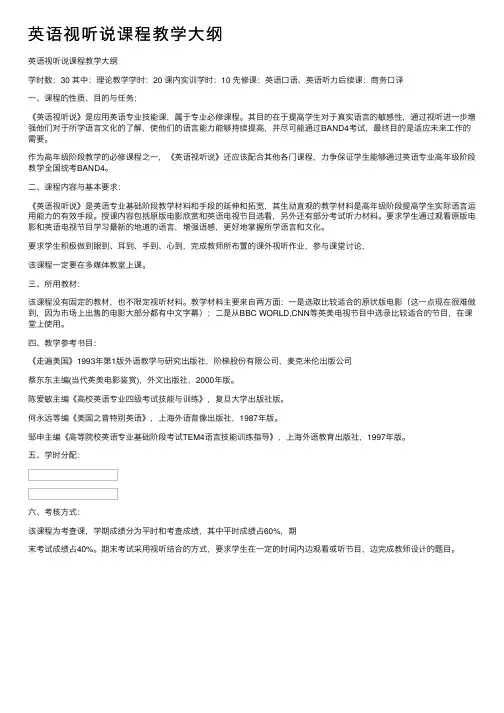
英语视听说课程教学⼤纲英语视听说课程教学⼤纲学时数:30 其中:理论教学学时:20 课内实训学时:10 先修课:英语⼝语、英语听⼒后续课:商务⼝译⼀、课程的性质、⽬的与任务:《英语视听说》是应⽤英语专业技能课,属于专业必修课程。
其⽬的在于提⾼学⽣对于真实语⾔的敏感性,通过视听进⼀步增强他们对于所学语⾔⽂化的了解,使他们的语⾔能⼒能够持续提⾼,并尽可能通过BAND4考试,最终⽬的是适应未来⼯作的需要。
作为⾼年级阶段教学的必修课程之⼀,《英语视听说》还应该配合其他各门课程,⼒争保证学⽣能够通过英语专业⾼年级阶段教学全国统考BAND4。
⼆、课程内容与基本要求:《英语视听说》是英语专业基础阶段教学材料和⼿段的延伸和拓宽,其⽣动直观的教学材料是⾼年级阶段提⾼学⽣实际语⾔运⽤能⼒的有效⼿段。
授课内容包括原版电影欣赏和英语电视节⽬选看,另外还有部分考试听⼒材料。
要求学⽣通过观看原版电影和英语电视节⽬学习最新的地道的语⾔,增强语感,更好地掌握所学语⾔和⽂化。
要求学⽣积极做到眼到、⽿到、⼿到、⼼到,完成教师所布置的课外视听作业,参与课堂讨论,该课程⼀定要在多媒体教室上课。
三、所⽤教材:该课程没有固定的教材,也不限定视听材料。
教学材料主要来⾃两⽅⾯:⼀是选取⽐较适合的原状版电影(这⼀点现在很难做到,因为市场上出售的电影⼤部分都有中⽂字幕);⼆是从BBC WORLD,CNN等英美电视节⽬中选录⽐较适合的节⽬,在课堂上使⽤。
四、教学参考书⽬:《⾛遍美国》1993年第1版外语教学与研究出版社,阶梯股份有限公司,麦克⽶伦出版公司蔡东东主编(当代英美电影鉴赏),外⽂出版社,2000年版。
陈爱敏主编《⾼校英语专业四级考试技能与训练》,复旦⼤学出版社版。
何永远等编《美国之⾳特别英语》,上海外语⾳像出版社,1987年版。
邹申主编《⾼等院校英语专业基础阶段考试TEM4语⾔技能训练指导》,上海外语教育出版社,1997年版。
五、学时分配:六、考核⽅式:该课程为考查课,学期成绩分为平时和考查成绩,其中平时成绩占60%,期末考试成绩占40%。
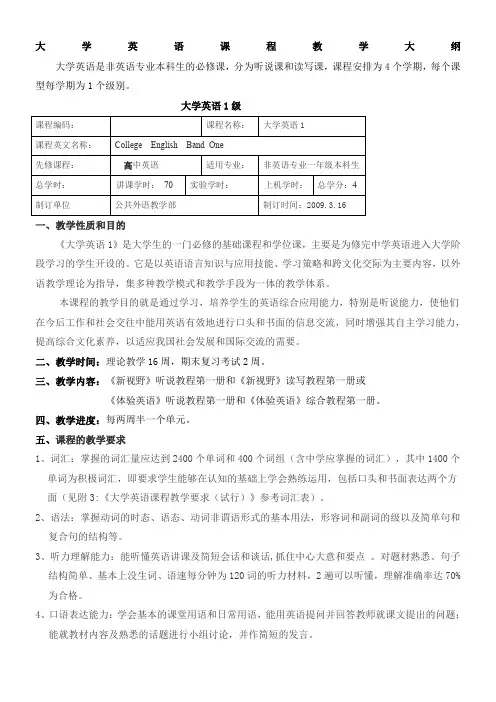
大学英语课程教学大纲大学英语是非英语专业本科生的必修课,分为听说课和读写课,课程安排为4个学期,每个课型每学期为1个级别。
大学英语1级一、教学性质和目的《大学英语1》是大学生的一门必修的基础课程和学位课,主要是为修完中学英语进入大学阶段学习的学生开设的。
它是以英语语言知识与应用技能、学习策略和跨文化交际为主要内容,以外语教学理论为指导,集多种教学模式和教学手段为一体的教学体系。
本课程的教学目的就是通过学习,培养学生的英语综合应用能力,特别是听说能力,使他们在今后工作和社会交往中能用英语有效地进行口头和书面的信息交流,同时增强其自主学习能力,提高综合文化素养,以适应我国社会发展和国际交流的需要。
二、教学时间:理论教学16周,期末复习考试2周。
三、教学内容:《新视野》听说教程第一册和《新视野》读写教程第一册或《体验英语》听说教程第一册和《体验英语》综合教程第一册。
四、教学进度:每两周半一个单元。
五、课程的教学要求1、词汇:掌握的词汇量应达到2400个单词和400个词组(含中学应掌握的词汇),其中1400个单词为积极词汇,即要求学生能够在认知的基础上学会熟练运用,包括口头和书面表达两个方面(见附3:《大学英语课程教学要求(试行)》参考词汇表)。
2、语法:掌握动词的时态、语态、动词非谓语形式的基本用法,形容词和副词的级以及简单句和复合句的结构等。
3、听力理解能力:能听懂英语讲课及简短会话和谈话,抓住中心大意和要点。
对题材熟悉、句子结构简单、基本上没生词、语速每分钟为120词的听力材料,2遍可以听懂,理解准确率达70%为合格。
4、口语表达能力:学会基本的课堂用语和日常用语,能用英语提问并回答教师就课文提出的问题;能就教材内容及熟悉的话题进行小组讨论,并作简短的发言。
5、阅读理解能力:掌握基本的阅读技能。
能读懂语言难度一般的普通题材的文章,运用学到的词汇和语法结构正确理解与课文难度相仿的文章,掌握中心大意以及说明中心大意的事实和细节,一般阅读速度达到每分钟60词。
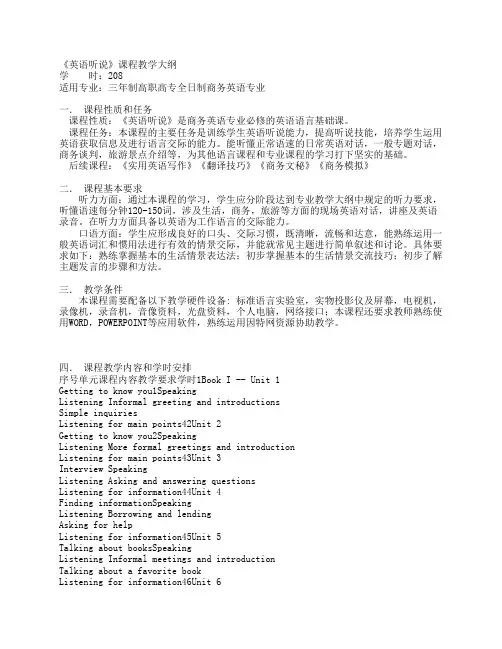
《英语听说》课程教学大纲学 时:208适用专业:三年制高职高专全日制商务英语专业一. 课程性质和任务 课程性质:《英语听说》是商务英语专业必修的英语语言基础课。
课程任务:本课程的主要任务是训练学生英语听说能力,提高听说技能,培养学生运用英语获取信息及进行语言交际的能力。
能听懂正常语速的日常英语对话,一般专题对话,商务谈判,旅游景点介绍等,为其他语言课程和专业课程的学习打下坚实的基础。
后续课程:《实用英语写作》《翻译技巧》《商务文秘》《商务模拟》二. 课程基本要求 听力方面:通过本课程的学习,学生应分阶段达到专业教学大纲中规定的听力要求,听懂语速每分钟120-150词,涉及生活,商务,旅游等方面的现场英语对话,讲座及英语录音。
在听力方面具备以英语为工作语言的交际能力。
口语方面:学生应形成良好的口头、交际习惯,既清晰,流畅和达意,能熟练运用一般英语词汇和惯用法进行有效的情景交际,并能就常见主题进行简单叙述和讨论。
具体要求如下:熟练掌握基本的生活情景表达法;初步掌握基本的生活情景交流技巧;初步了解主题发言的步骤和方法。
三. 教学条件 本课程需要配备以下教学硬件设备: 标准语言实验室,实物投影仪及屏幕,电视机,录像机,录音机,音像资料,光盘资料,个人电脑,网络接口;本课程还要求教师熟练使用WORD,POWERPOINT等应用软件,熟练运用因特网资源协助教学。
四. 课程教学内容和学时安排序号单元课程内容教学要求学时1Book I -- Unit 1Getting to know you1SpeakingListening Informal greeting and introductionsSimple inquiriesListening for main points42Unit 2Getting to know you2SpeakingListening More formal greetings and introductionListening for main points43Unit 3Interview SpeakingListening Asking and answering questionsListening for information44Unit 4Finding informationSpeakingListening Borrowing and lendingAsking for helpListening for information45Unit 5Talking about booksSpeakingListening Informal meetings and introductionTalking about a favorite bookListening for information46Unit 6What's your hometownSpeakingListening Word stressSpeech practice: Group discussionsListening for information47Unit 7Where SpeakingListening Asking and giving directionsListening for detail48Unit 8Invitations SpeakingListening Giving and accepting invitationListening for detail49Unit 9Talking about TV andmovieSpeakingListening Arriving at the partyListening for detail410Unit 10What's your favoriteMusic?SpeakingListening Giving thanks and saying goodbyeListening for detail411Unit 11Under the weatherSpeakingListening Personal inquiriesListening for detail412Unit 12Sport SpeakingListening Making arrangementsListening for detail4复习考试413Book II - Unit 1New faces, new friendsSpeakingListening Informal greetings and introductionListening for information414Unit 2Talking abouttechnologySpeakingListening Expressing existence, availabilityand surpriseListening: Similarities and difference415Unit 3Facts and figuresSpeakingListening Expressing quantity, duration, existence and approximation Note-making4序号单元课程内容教学要求学时16Unit 4Let's go to a movie!SpeakingListening Giving, accepting and refusinginvitationsDescriptions of films417Unit 5Talking about languageSpeakingListening Talking about abilityListening for information418Unit 6Help!SpeakingListening Reporting an emergencyListening for information419Unit 7Space researchSpeakingListening Asking for and giving help and adviceListening for information420Unit 8Sources of informationSpeakingListening Expressing likes and dislikesSpot dictation421Unit 9Talking about foodSpeakingListening Expressing wantsListening for detail422Unit 10Using the telephoneSpeakingListening Telephone messagesListening for information423Unit 11International communicationsSpeakingListening Making promisesListening for information424Unit 12Shopping SpeakingListening Asking the wayCompound dictation4复习考试425Unit III - Unit 1How do you do!SpeakingListening Informal and formal greeting and self-introductions Spot dictation426Unit 2Introducing a speakerSpeakingListening Informal and formal self-introductionsSpot dictation427Unit 3Giving a speechSpeakingListening Asking & answering questions in formal situations Taking notes on a speech428Unit 4A trip down the riverSpeakingListening Making arrangementsHow to give a speech429Unit 5The motion picture industrySpeakingListening Giving, accepting and declining invitationWriting and giving a speech430Unit 6Help! My computer's downSpeakingListening Asking for and giving adviceCompound dictationListening and giving note-making431Unit 7Come for a mealSpeakingListening Giving, accepting and declining a meal invitation Listening and giving note-making4序号单元课程内容教学要求学时32Unit 8Breaking the iceSpeakingListening Talking over a mealListening and giving note-making433Unit 9Welcome to the US!SpeakingListening Giving informationListening and giving note-making434Unit 10Talking about energySpeakingListening Asking for and giving informationListening and giving note-making435Unit 11Money makes the world go roundSpeakingListening Expressing needsCompound dictation436Unit 12The world of workSpeakingListening Performing in a job interviewListening comprehension4复习考试437Book IV - Unit 1Learning strategiesSpeakingListeningCommunication strategiesInformal and formal ways of asking for advice Spot dictationDiscussion 438Unit 2On the way to AustraliaSpeakingListeningCommunication strategiesMaking travel arrangementsHow to give a speechMaking new friends439Unit 3On vacationSpeakingListeningCommunication strategiesTalking about a hotelListening and note-makingMaking complaints440Unit 4Visiting "down under"SpeakingListeningCommunication strategiesArriving at the airportNegotiating tacticsNegotiating441Unit 5Good healthSpeakingListeningCommunication strategiesAgreeing and disagreeingHow to organize a debateDebating442Unit 6Talking is good for youSpeakingListeningCommunication strategiesSmall talkListing comprehensionPresenting yourself443Unit 7Fire safetySpeakingListeningCommunication strategiesGiving instructions, advice and reasonGiving a presentation444Unit 8How happy are you?SpeakingListeningCommunication Discussing the results of a questionnaireSocial interaction strategies4序号单元课程内容教学要求学时45Unit 9Talking about scienceSpeakingListeningCommunication strategiesTelevision interviewsCompound dictationInterview on TV and radio446Unit 10Nice weather for the time of year!SpeakingListeningCommunication strategiesSmall talkCompound dictationPresentations447Unit 11New ideasSpeakingListeningCommunication strategiesTalking about a science documentaryPresentation448Unit 12Truth is stranger than fictionSpeakingListeningCommunication strategiesTalking about booksExpressing preferenceDebate4复习考试4学时总计208五. 教学方法 本课程注重理论教学与实践教学的有机结合,在教学中以实践和训练为主,最大限度为学生提供实践机会。
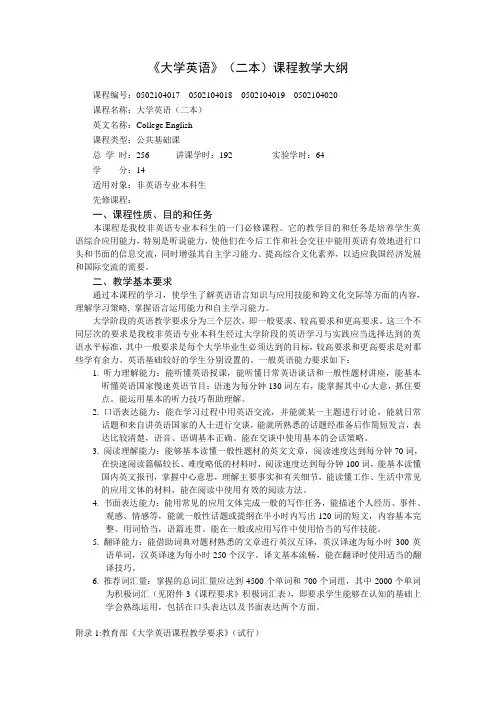
《大学英语》(二本)课程教学大纲课程编号:0502104017 0502104018 0502104019 0502104020课程名称:大学英语(二本)英文名称:College English课程类型:公共基础课总学时:256 讲课学时:192 实验学时:64学分:14适用对象:非英语专业本科生先修课程:一、课程性质、目的和任务本课程是我校非英语专业本科生的一门必修课程。
它的教学目的和任务是培养学生英语综合应用能力,特别是听说能力,使他们在今后工作和社会交往中能用英语有效地进行口头和书面的信息交流,同时增强其自主学习能力、提高综合文化素养,以适应我国经济发展和国际交流的需要。
二、教学基本要求通过本课程的学习,使学生了解英语语言知识与应用技能和跨文化交际等方面的内容,理解学习策略, 掌握语言运用能力和自主学习能力。
大学阶段的英语教学要求分为三个层次,即一般要求、较高要求和更高要求。
这三个不同层次的要求是我校非英语专业本科生经过大学阶段的英语学习与实践应当选择达到的英语水平标准,其中一般要求是每个大学毕业生必须达到的目标,较高要求和更高要求是对那些学有余力、英语基础较好的学生分别设置的。
一般英语能力要求如下:1. 听力理解能力:能听懂英语授课,能听懂日常英语谈话和一般性题材讲座,能基本听懂英语国家慢速英语节目;语速为每分钟130词左右,能掌握其中心大意,抓住要点。
能运用基本的听力技巧帮助理解。
2. 口语表达能力:能在学习过程中用英语交流,并能就某一主题进行讨论,能就日常话题和来自讲英语国家的人士进行交谈,能就所熟悉的话题经准备后作简短发言,表达比较清楚,语音、语调基本正确。
能在交谈中使用基本的会话策略。
3. 阅读理解能力:能够基本读懂一般性题材的英文文章,阅读速度达到每分钟70词,在快速阅读篇幅较长、难度略低的材料时,阅读速度达到每分钟100词,能基本读懂国内英文报刊,掌握中心意思,理解主要事实和有关细节,能读懂工作、生活中常见的应用文体的材料,能在阅读中使用有效的阅读方法。
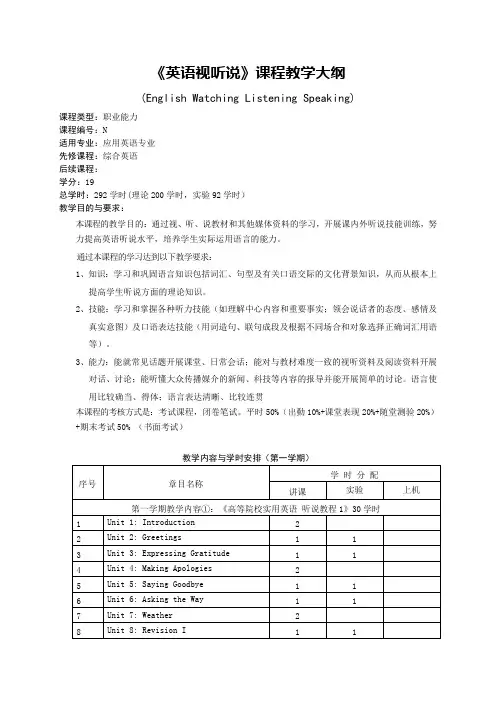
《英语视听说》课程教学大纲(English Watching Listening Speaking)课程类型:职业能力课程编号:N适用专业:应用英语专业先修课程:综合英语后续课程:学分:19总学时:292学时(理论200学时,实验92学时)教学目的与要求:本课程的教学目的:通过视、听、说教材和其他媒体资料的学习,开展课内外听说技能训练,努力提高英语听说水平,培养学生实际运用语言的能力。
通过本课程的学习达到以下教学要求:1、知识:学习和巩固语言知识包括词汇、句型及有关口语交际的文化背景知识,从而从根本上提高学生听说方面的理论知识。
2、技能:学习和掌握各种听力技能(如理解中心内容和重要事实;领会说话者的态度、感情及真实意图)及口语表达技能(用词造句、联句成段及根据不同场合和对象选择正确词汇用语等)。
3、能力:能就常见话题开展课堂、日常会话;能对与教材难度一致的视听资料及阅读资料开展对话、讨论;能听懂大众传播媒介的新闻、科技等内容的报导并能开展简单的讨论。
语言使用比较确当、得体;语言表达清晰、比较连贯本课程的考核方式是:考试课程,闭卷笔试。
平时50%(出勤10%+课堂表现20%+随堂测验20%)+期末考试50% (书面考试)教学内容与学时安排(第一学期)教学内容与学时安排(第二学期)绪论英语听力既是学习语言的一种途径,也是运用语言的一个过程。
收听英语新闻、歌曲,看英文原版录象,是集实用性和娱乐性于一身的提高英语听力的有效方式.英语学习者感到提高听力很困难.具体困难所在,不同水平的学习者有不同的状况.初学者由于练习少、反应慢,词汇量不足,一段话中只能零星地听懂一些单词或感觉耳熟.对已达一定英语水平的学习者来说,造成听力困难的原因有以下几点:一、读速快时听不清,尤其是在有连读.弱读的音节时,或是存在所谓“吞音”现象时听不清,因而影响整体判断。
开始时难以进入状态,影响了对下文的理解,或中间有不熟悉的单词,中断了理解;二、注意力过度集中于听懂当前语句,很快忘记前面所听过的内容;竭力听清每一个单词,可是往往会把握不住全篇。
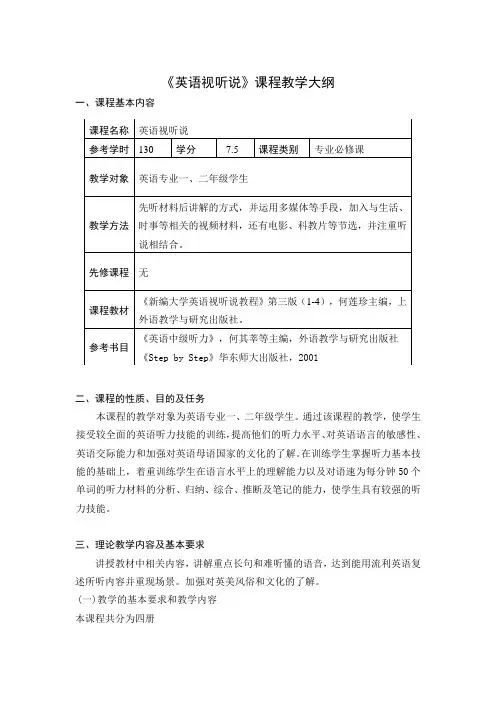
《英语视听说》课程教学大纲一、课程基本内容二、课程的性质、目的及任务本课程的教学对象为英语专业一、二年级学生。
通过该课程的教学,使学生接受较全面的英语听力技能的训练,提高他们的听力水平、对英语语言的敏感性、英语交际能力和加强对英语母语国家的文化的了解。
在训练学生掌握听力基本技能的基础上,着重训练学生在语言水平上的理解能力以及对语速为每分钟50个单词的听力材料的分析、归纳、综合、推断及笔记的能力,使学生具有较强的听力技能。
三、理论教学内容及基本要求讲授教材中相关内容,讲解重点长句和难听懂的语音,达到能用流利英语复述所听内容并重现场景。
加强对英美风俗和文化的了解。
(一)教学的基本要求和教学内容本课程共分为四册第一册Unit 1 Personal Relationships1、基本要求:正确理解各种人际关系。
2、教学内容:1)邻里关系;2)帮助他人;3)夫妻关系;4)理想的室友。
Unit 2 Remembering and Forgetting1、基本要求:记忆能力训练。
2、教学内容:1)健忘的教授;2)健忘的自己;3)记忆问题;4)记忆方法。
Unit 3 More than Words1、基本要求:身势语的功能与运用2、基本内容:1)马克吐温的故事;2)花语;3)交际技巧。
Unit 4 Fresh Start1、基本要求:大学新生的问题与解决方法2、教学内容:1)大学新生在国外;2)学习英文的方法;3)图书馆借书。
Unit 5 Animal World1、基本要求:各种动物的英文名称及故事2、教学内容:1)狐狸与兔子;2)老虎与农夫;3)救人的狗;4)新型动物Unit 6 World of Mystery1、基本要求:背景知识的理解与运用。
2、教学内容:1)UFO;2)翁贝托一世的故事;3)尼斯湖;4)人类与外星人Unit 7 Choices in Life1、基本要求:抉择的重要性。
2、教学内容:1)蚂蚁与蝉的故事;2)富翁的故事;3)合作。
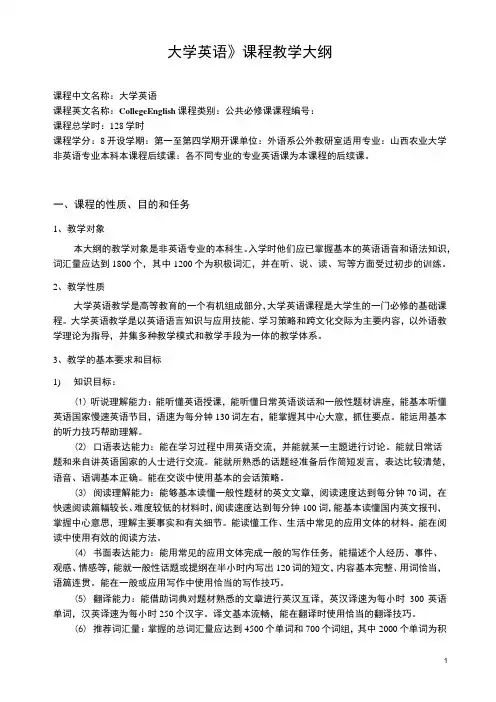
大学英语》课程教学大纲课程中文名称:大学英语课程英文名称:CollegeEnglish课程类别:公共必修课课程编号:课程总学时:128学时课程学分:8开设学期:第一至第四学期开课单位:外语系公外教研室适用专业:山西农业大学非英语专业本科本课程后续课:各不同专业的专业英语课为本课程的后续课。
一、课程的性质、目的和任务1、教学对象本大纲的教学对象是非英语专业的本科生。
入学时他们应已掌握基本的英语语音和语法知识,词汇量应达到1800个,其中1200个为积极词汇,并在听、说、读、写等方面受过初步的训练。
2、教学性质大学英语教学是高等教育的一个有机组成部分,大学英语课程是大学生的一门必修的基础课程。
大学英语教学是以英语语言知识与应用技能、学习策略和跨文化交际为主要内容,以外语教学理论为指导,并集多种教学模式和教学手段为一体的教学体系。
3、教学的基本要求和目标1)知识目标:(1)听说理解能力:能听懂英语授课,能听懂日常英语谈话和一般性题材讲座,能基本听懂英语国家慢速英语节目,语速为每分钟130词左右,能掌握其中心大意,抓住要点。
能运用基本的听力技巧帮助理解。
(2)口语表达能力:能在学习过程中用英语交流,并能就某一主题进行讨论。
能就日常话题和来自讲英语国家的人士进行交流。
能就所熟悉的话题经准备后作简短发言,表达比较清楚,语音、语调基本正确。
能在交谈中使用基本的会话策略。
(3)阅读理解能力:能够基本读懂一般性题材的英文文章,阅读速度达到每分钟70词,在快速阅读篇幅较长、难度较低的材料时,阅读速度达到每分钟100词,能基本读懂国内英文报刊,掌握中心意思,理解主要事实和有关细节。
能读懂工作、生活中常见的应用文体的材料。
能在阅读中使用有效的阅读方法。
(4)书面表达能力:能用常见的应用文体完成一般的写作任务,能描述个人经历、事件、观感、情感等,能就一般性话题或提纲在半小时内写出120词的短文,内容基本完整、用词恰当,语篇连贯。
《大学英语(II-4)》课程教学大纲一、基本信息中文名称:大学英语(II-4)英文名称:College English (II-4)开课学院:基础教学部课程编码:23010018020属性:理论学分: 2 总学时:32 实验学时:0 上机学时:0适用专业:校区非英语专业本科生先修课程:2301004040 大学英语(II-3)大纲执笔:基础教学部鲜义才大纲审批:基础教学部学术委员会教学院长:鲜义才修订时间:2020年4月二、课程定位与性质1.课程定位大学外语教育是我国高等教育的重要组成部分,对于促进大学生知识、能力和综合素质的协调发展具有重要意义。
大学英语作为大学外语教育的最主要内容,是大多数非英语专业大学生本科教育阶段必修的公共基础课程,在人才培养方面具有不可替代的重要作用。
2.课程性质大学英语课程是高等学校人文教育的一部分,兼具工具性和人文性双重性质。
就工具性而言,大学英语课程是基础教育阶段英语教学的提升和拓展,主要目的是在高中英语教学的基础上进一步提高学生英语听、说、读、写、译的能力。
大学英语的工具性也体现在专门用途英语上,学生可以通过学习与专业或未来工作有关的学术英语或职业英语,获得在学习或职业领域进行交流的相关能力。
就人文性而言,大学英语课程的重要任务之一是进行跨文化教育。
语言是文化的载体,同时也是文化的组成部分,学生学习和掌握英语这一交流工具,除了学习、交流先进的科学技术或专业信息外,还要了解国外的社会与文化,增进对不同文化的理解、对中外文化异同的意识,培养跨文化交际能力。
三、教学目标和教学要求1. 教学目标大学英语的教学目标是培养学生听、说、读、写、译的应用能力,增强跨文化交际意识和交际能力,同时发展自主学习能力,提高综合文化素养,使他们在学习、生活、社会交往和未来工作中能够有效地使用英语,满足国家、社会、学校和个人发展的需要。
2. 教学要求大学英语教学应贯彻分类指导、因材施教的原则,以适应个性化教学的需要。
大学英语课程教学大纲依据教育部2007年7月高教厅【2007】3号文件《大学英语课程教学要求》(简称《课程要求》),特制定本大纲指导我校非英语专业本科生英语教学。
课程基本概况课程名称:大学英语College English课程编码:06110010 ,06110020, 06110030, 06110040课程总学时:232 (其中读写110学时,听说110学时,上机辅导12学时)课程性质:必修课课程学分:14.5 学分开设学期:第一至第三学期64 学时/ 学期第四学期40 学时/ 学期开课院系:外国语学院公共英语一系、二系开课对象:高等学校非英语专业本科生本课程后续课:各不同专业的专业英语课为本课程的后续课程一、课程的性质与教学目标大学英语教学是高等教育的一个有机组成部分,大学英语课程是大学生的一门必修的基础课程。
大学英语是以外语教学理论为指导,以英语语言知识与应用技能、跨文化交际和学习策略为主要内容,并集多种教学模式和教学手段为一体的教学体系。
大学英语的教学目标是培养学生的英语综合应用能力,特别是听说能力,使他们在今后学习、工作和社会交往中能用英语有效地进行交际,同时增强其自主学习能力,提高综合文化素养,以适应我国社会发展和国际交流的需要。
二、教学要求和教学任务鉴于学生英语水平的实际差异,大学英语教学贯彻分级施教、因材施教的原则,以适应个性化教学的实际需要。
学生经过初、高中的英语学习,应该已掌握了基本的英语语音和语法知识,词汇2228个(含积极词汇1087个),具备听、说、读、写、译简单技能。
在此基础上,通过分级测试,将学生分为A级和B级授课。
大学英语教学要求可分为两个层次,即一般要求和较高要求。
高等学校非英语专业本科生经过大学英语课程的学习与实践应达到一般要求的标准。
两个层次的英语能力要求如下:一般要求:1. 听力理解能力:能听懂英语授课,能听懂日常英语谈话和一般性题材的讲座,能听懂语速较慢(每分钟130 ~150词)的英语广播和电视节目,能掌握其中心大意,抓住要点。
大学英语听说课程教学大纲 课程名称:大学英语听说课 英文名称:College English (Listening and Spoken) 学 时 数: 96学时 课程编号:050202B 学 分 数:6学分 适用专业:非英语专业的本科各专业 一、 一、 课程的性质、目的和任务 “大学英语听说课”是我校依据高教部颁发的《大学英语课程教学要求》中提出的培养学生的英语综合能力, 特别是听说能力的教学目标,以及社会对大学生英语应用能力要求不断提高的形势下, 面向全校非英语专业大学本科生开设的一门公共必修课。使学生在今后工作和社会交往中能用英语有效地进行口头和书面的信息交流,以适应我国社会发展和国际交流的需要。该课程分为英语听力和口语两部分,在大学本科第一学期、第二学期和第三学期开设。通过本课程的学习,使基础较好的学生能够达到该大纲的较高要求,一般基础的学生能够达到该大纲的基本要求。 二、课程教学内容的基本要求、重点和难点
等 级 教学任务 主要内容 主要教学 方式 学时分配
辅导
答疑 比例
CE1 听 基本要求 能听懂英语讲课及简短会话和谈话,抓住中心大意和要点。语速为100wpm。
讲课 32学时 一次
/周 较高要求
能听懂英语讲课及简短会话、 谈话和讲座,抓住中心大意、 要点和有关细节,领会作者观 点和态度。语速为120wpm。
具体内容 1、新视野听说教程 (1册) 2、《大学英语听力分级教程》(上)Unit 1-Unit 10
说
基本要求
能进行简单的日常会话,能就 教材内容作简短回答和复述, 能就熟悉的话题做简短发言。 表达思想基本清楚。
较高要求
能进行日常会话,能就教材内 容展开讨论和复述,能就熟悉 的话题展开谈话。表达思想基 本清楚。
具体内容 《大学英语口语分级教程》 Unit 1 My family Unit 2 Hometown Unit 3 Sports Activities Unit 4 Leisure Time Unit 5 Plans For Future Unit 6 Language Study Unit 7 Festivals and Special Occasions Unit 8 Food and Eating Habits Unit 9 Personal Description Unit 10 Campus Life CE2 听
基本要求
能听懂英语讲课及简短会话、 谈话和讲座,抓住中心大意、 要点和有关细节,领会作者观 点和态度。语速为120wpm。
讲 课 32学时 一次/周
较高要求 能大概听懂英语国家人士讲话 和讲座,能基本听懂题材熟悉、 篇幅较长的国内广播或电视节 目,语速为每分钟135词左 右,能掌握中心大意抓住要点。
具体内容 1、新视野听说教程 (2册) 2、《大学英语听力分级教程》(上)Unit11-Unit 20
说 基本要求
能进行日常会话,能就教材内 容展开讨论和复述,能就熟悉 的话题展开谈话。表达思想基 本清楚。 较高要求 能和英语国家人士进行一定程 度的交流,能够掌握一定的会话策略,能基本表达个人意见、情感、观点等,能基本陈述事实、事件、理由等,语音、语调基本正确。
具体内容 《大学英语口语分级教程》 Unit 11 Job Hunting Unit 12 Trip Unit 13 Weather Unit 14 Shopping Unit 15 Music Unit 16 My Gift and Meaningful Objects Unit 17 Environment Unit 18 Modern Technology Unit 19 Media Unit 20 Education
CE3 听 基本要求
能大概听懂英语国家人士讲话 和讲座,能基本听懂题材熟悉、 篇幅较长的国内广播或电视节 目,语速为每分钟130词左 右,能掌握中心大意抓住要点。
讲 课 32学 时 一次/周 较高要求 能基本听懂英语国家人士的谈话和讲座,能听懂题材熟悉、篇幅较长的国内英语广播或电视节目,语速为每分钟150词左右,能掌握其中心大意,抓住要点和相关细节。能基本听懂外国专家用英语讲授的专业课程。
具体内容 1、新视野听说教程(3册) 2、《大学英语听力分级教程》(下)Unit 21-Unit 30 说
基本要求
能和英语国家人士进行一定程 度的交流,能够掌握一定的会话策略,能基本表达个人意见、情感、观点等,能基本陈述事实、事件、理由等,语音、语调基本正确。
较高要求 能就一般或专业性话题较为流利、准确地进行对话或讨论,能用简练的语言概括内容较长、语言稍难的文本或讲话,能在国际会议和专业交流中宣读论文并参加讨论。 具体内容 《大学英语口语分级教程》 Unit 21 Changes Unit 22 Transportation Unit 23 Friendship and Relationship Unit 24 Internet Unit 25 Wild Life in My Country Unit 26 Clothing Unit 27 Social Problems Unit 28 Wealth and Health Unit 29 Part-Time Job Unit 30 Going Abroad Unit 31 Steps to Success Unit 32 Unforgettable Experience
四、课程各教学环节的要求
要求听说课在语音室上,每周一次两学时。学生在课后参加学校组织的周英语角活动、各种英语晚会,每个班级每周组织一次英语角;学生上网做网上听说练习。
五、本课程与其他课程的联系
本课程的后续课程是高年级的高级英语听说选修课。 六、考核方式
大学英语听说课是考试课,考试形式是(1)由主考教师对学生进行小组面试;(2)组织听力考试;(3)通过网络测试手段,检查学生完成指定的网络测试项目。评分标准:口试占40%,听力占60%,合计100分。
七、教学参考书目
1、《新视野大学英语》听说教程1-4外语教学与研究出版社 2001年底1版 2、《大学英语听力分级教程》上、下册。孙力主编。吉林科学技术出版社出版。2002年 3、《新编大学英语》1、2、3、4册。浙江大学编著。外语教学与研究出版社。1999年4月第一版。 2004 至2005 学年度第 一 学期 04级各 班《 大 学 英 语 听力 》课程授课计划 一、 一、 说明 1.1.课程的教学目的要求 通过这一学期的英语教学,培养学生具有一定的听、说能力。重点提高学生的听力水平使学生达到大学英语一级水平,进一步提高学生运用英语的综合能力。 2.2.学时数分配情况:
教学计划 规定的总 学 时 上学期 已进行的 学时数 本 学 期 的 学 时 分 配 下学期 尚余的 学时数
课内外
比例 总 计 理论教学 实 验 习题课 测 验 设 计
2×16×4 0 32 32 2×16×3 1:3 3.3.主要教学参考书及资料:
《新视野大学英语听说教程》第一册 《大学英语听力分级教程》 《新视野大学英语》教师用书 《大学英语口语分级教程》 《现代英语用法词典》 《柯林斯精选英语辞典》等。
4.4.成绩考核方式和及格标准: 成绩考核方式:听力为闭卷考试。 及 格 标 准: 听力+ 口语=100分,60分为及格。
5.5.学生学习本课程的要求: 要求学生课上认真听讲,课后复习以便巩固知识,按要求完成各项作业,保证课外自己每天练习听力。
6.提高教学质量的措施: 在教学中不断探索教学规律,推广教改成果,坚持集体备课,细致批改作业,及时进行讲评,定期对学生进行阶段水平考试。 进行听力、口语训练,注意与学生互动。 开展丰富多彩的第二课堂活动,完善教学效果
二、授课计划 总教学周15周。 “十一”放假一周。
周 别 课 堂 教 学 课外作业 完成情况 星期 时数 教 学 内 容 教学方式 布置作业题数 复习及作业所需时
间
一 听力 2 听力 Unit 1及口语训练 讲授 做听力课后练习,预习Unit 1 Section A 3小时
二 听力 2 听力 Unit 1——Unit 2及口语训练 讲授 做听力课后练习, 3小时
三 听力 2 听力Unit 2 及口语训练 讲授 做听力课后练习, 3小时
四 听力 2 听力 Unit 3及口语训练 讲授 做听力课后练习,预习Unit 3 Section A 3小时
五 听力 2 听力 Unit3----Unit 4及口语训练 讲授 做听力课后练习, 3小时
六 听力 2 听力Unit 4及口语训练 讲授 做听力课后练习, 3小时
七 听力 2 听力 Unit 5及口语训练 讲授 做听力课后练习,预习Unit 5 Section A 3小时
八 听力 2 听力 Unit5----Unit 6及口语训练 讲授 做听力课后练习, 3小时
九 听力 2 听力 Unit 6及口语训练 讲授 做听力课后练习, 3小时
十 听力 2 听力Unit 7及口语训练 讲授 做听力课后练习,预习Unit 7 Section A 3小时
十一 听力 2 听力 Unit 7----unit 8及口语训练 讲授 做听力课后练习, 3小时 十二 听力 2 听力 Unit 8及口语训练 讲授 做听力课后练习, 3小时
十三 听力 2 听力 Unit 9及口语训练 讲授 做听力课后练习,预习unit 9 Section A 3小时
十四 听力 2 听力课 Unit 9---及口语训练 讲授 做听力课后练习, 3小时